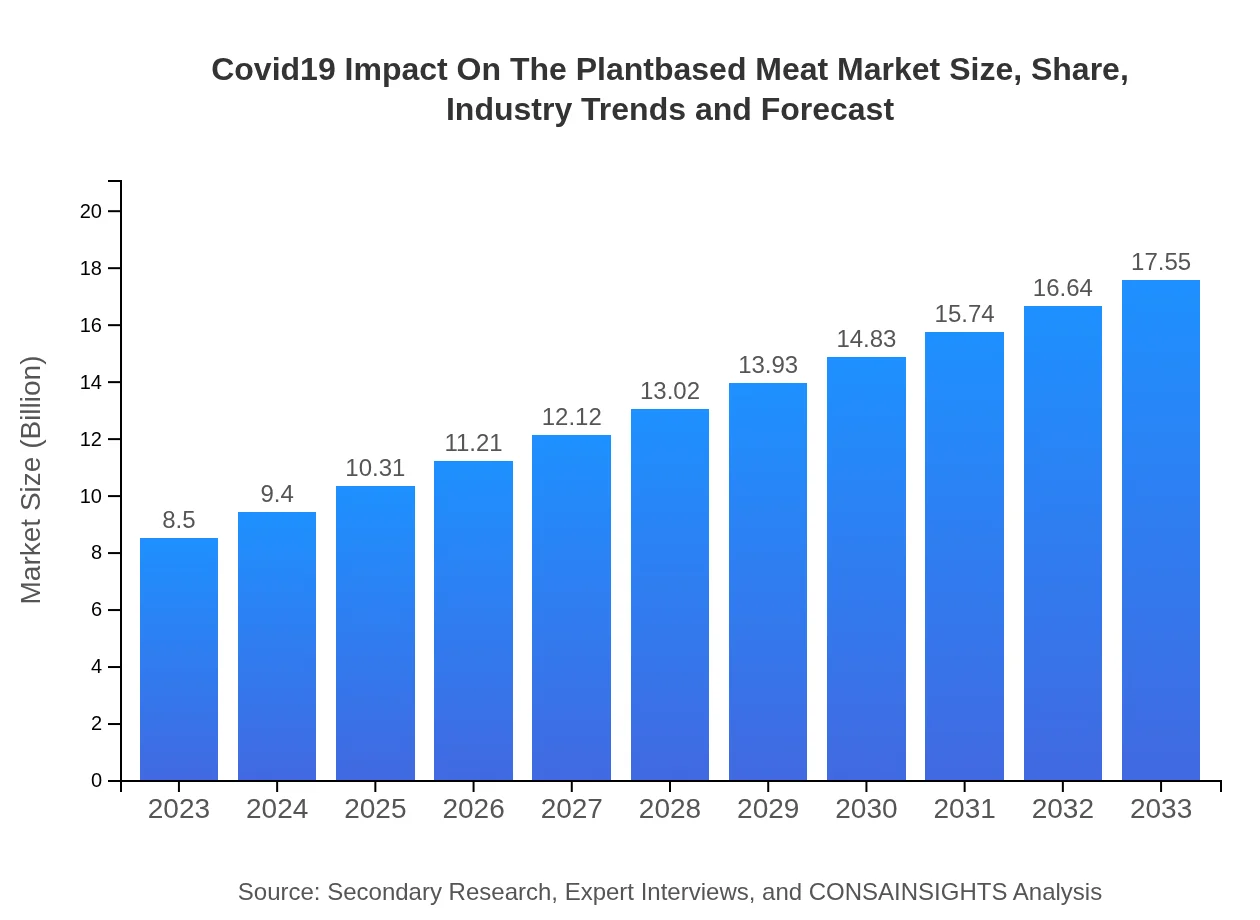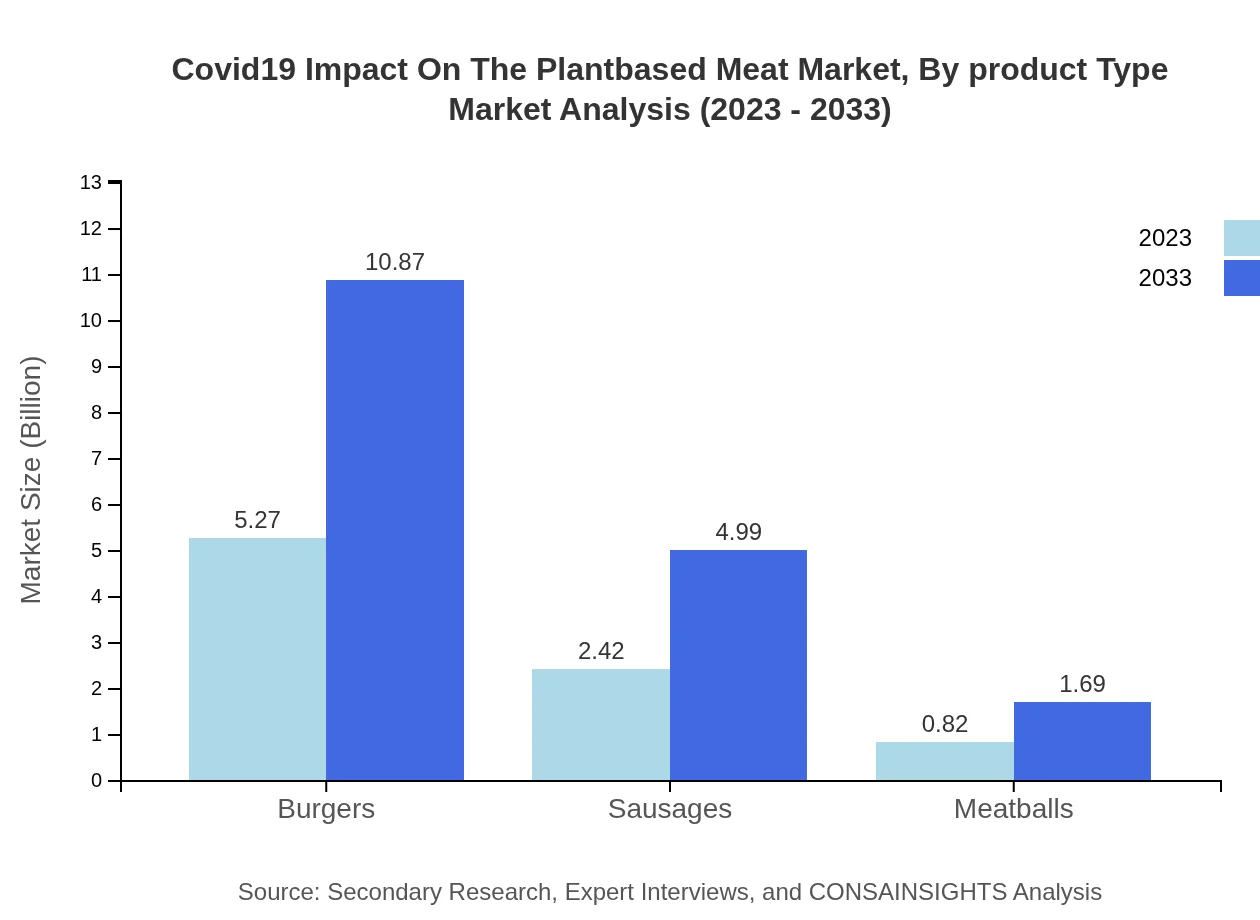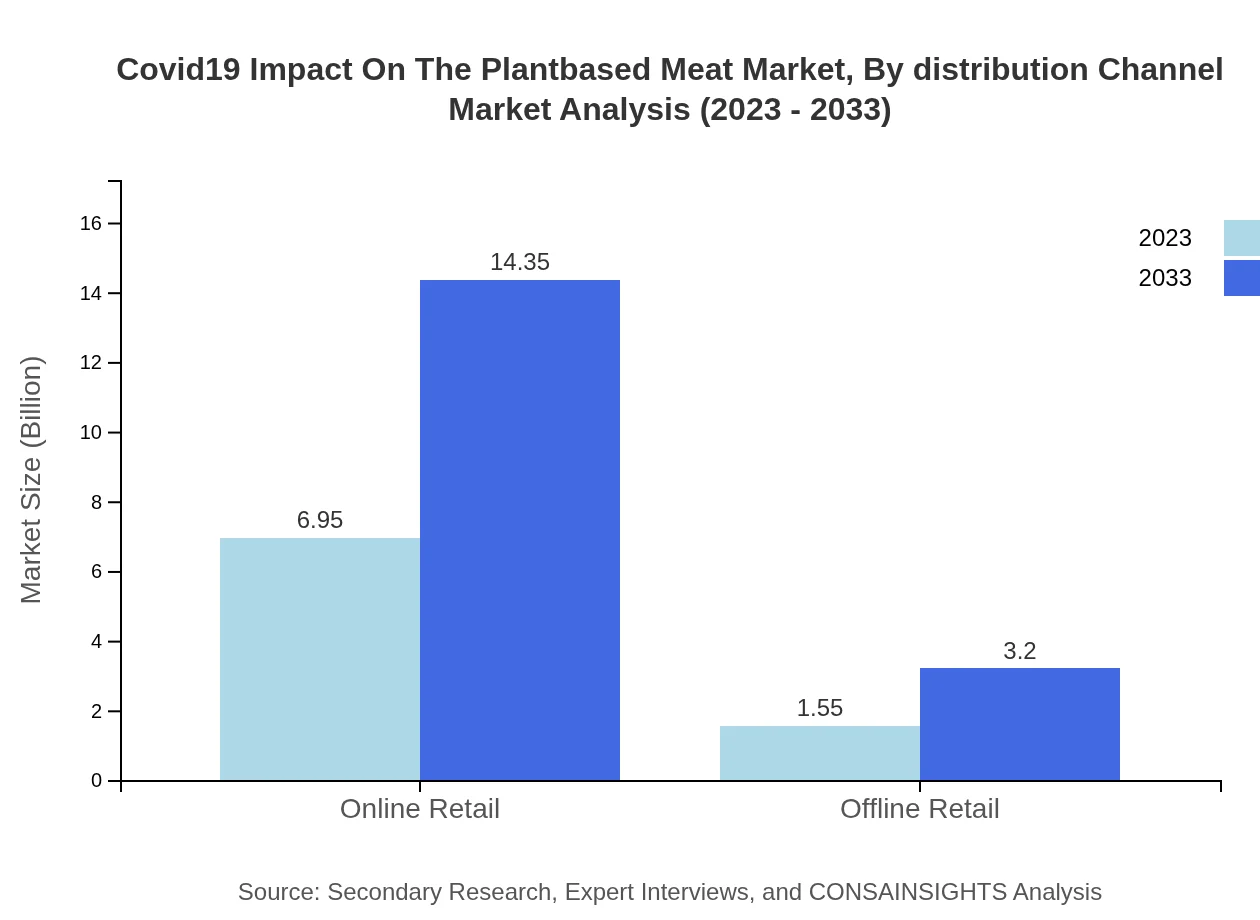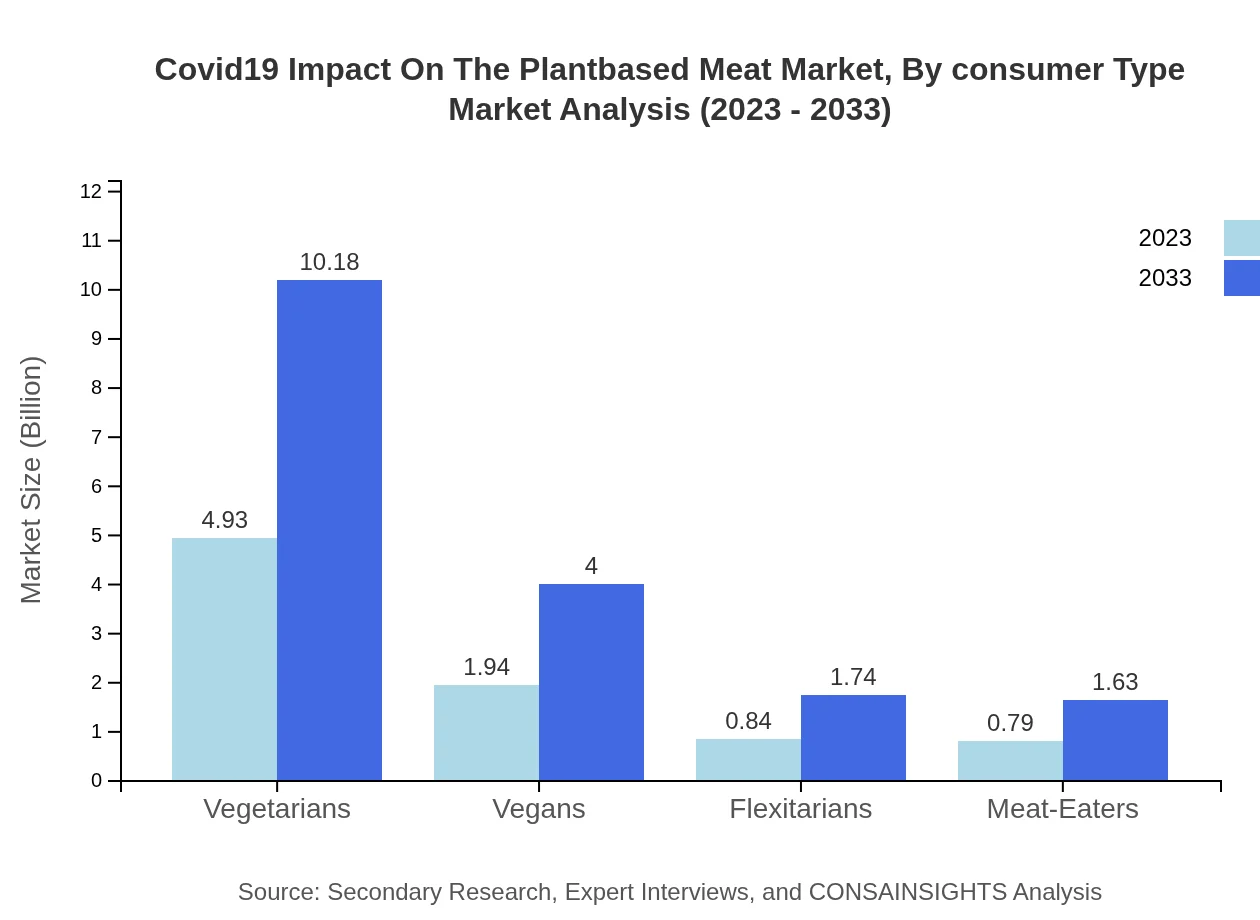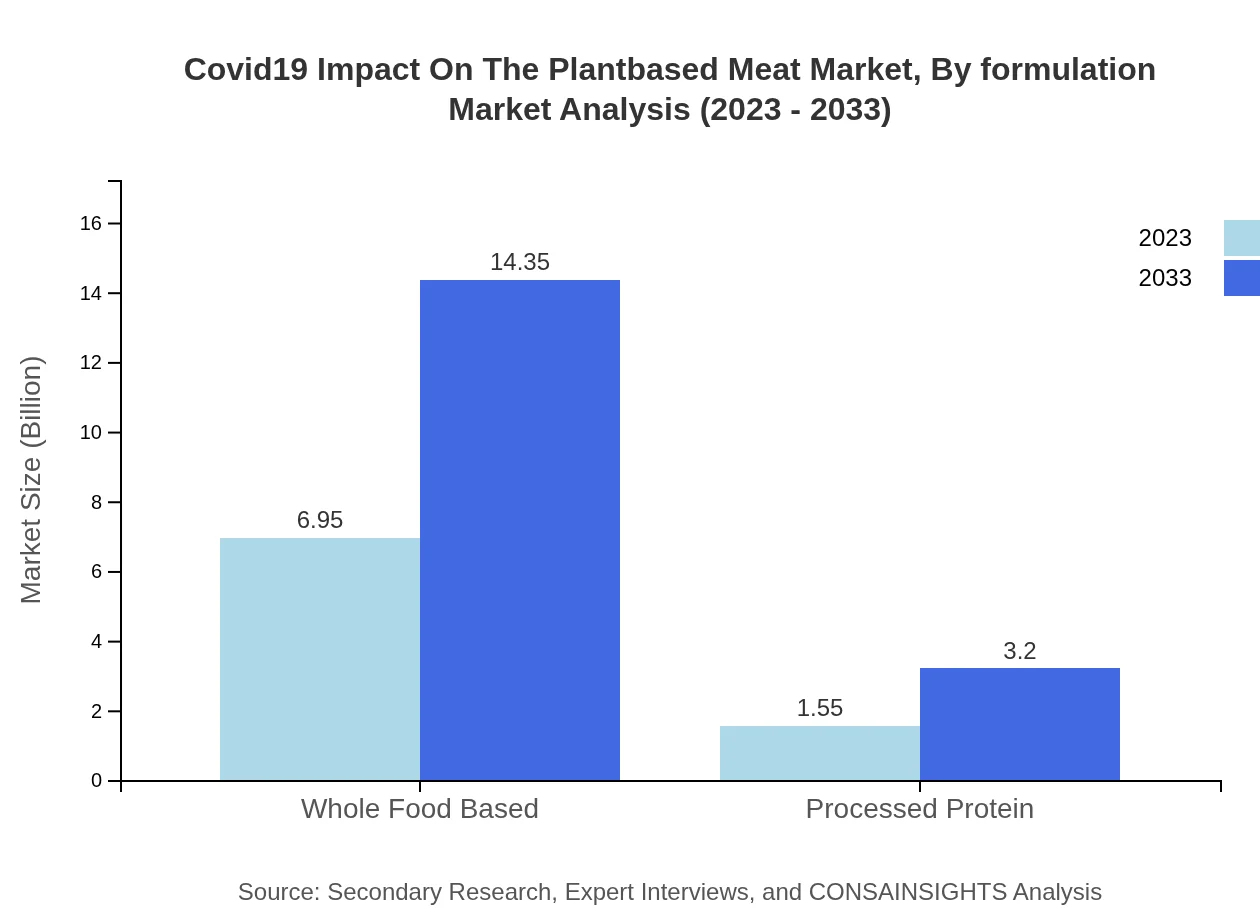Covid19 Impact On The Plantbased Meat Market Report
Published Date: 31 January 2026 | Report Code: covid19-impact-on-the-plantbased-meat
Covid19 Impact On The Plantbased Meat Market Size, Share, Industry Trends and Forecast to 2033
This report extensively analyzes the impact of COVID-19 on the plant-based meat market from 2023 to 2033. It delivers insights on market trends, size, growth rate, and significant regional variations, together with forecasts that can inform stakeholders and businesses in planning strategies accordingly.
| Metric | Value |
|---|---|
| Study Period | 2023 - 2033 |
| 2023 Market Size | $8.50 Billion |
| CAGR (2023-2033) | 7.3% |
| 2033 Market Size | $17.55 Billion |
| Top Companies | Beyond Meat, Impossible Foods, MorningStar Farms, Oumph! |
| Last Modified Date | 31 January 2026 |
Covid19 Impact On The Plantbased Meat Market Overview
Customize Covid19 Impact On The Plantbased Meat Market Report market research report
- ✔ Get in-depth analysis of Covid19 Impact On The Plantbased Meat market size, growth, and forecasts.
- ✔ Understand Covid19 Impact On The Plantbased Meat's regional dynamics and industry-specific trends.
- ✔ Identify potential applications, end-user demand, and growth segments in Covid19 Impact On The Plantbased Meat
What is the Market Size & CAGR of Covid19 Impact On The Plantbased Meat market in 2023?
Covid19 Impact On The Plantbased Meat Industry Analysis
Covid19 Impact On The Plantbased Meat Market Segmentation and Scope
Tell us your focus area and get a customized research report.
Covid19 Impact On The Plantbased Meat Market Analysis Report by Region
Europe Covid19 Impact On The Plantbased Meat Market Report:
Europe’s market is expected to expand from USD 2.48 billion in 2023 to USD 5.12 billion in 2033. This growth is spurred by robust consumer advocacy for sustainability and health, along with regulatory support for plant-based initiatives.Asia Pacific Covid19 Impact On The Plantbased Meat Market Report:
The Asia Pacific region, valued at USD 1.43 billion in 2023, is expected to reach USD 2.95 billion by 2033. Growing health awareness and a shift towards vegetarianism among urban populations drive this growth, alongside increasing distribution through modern retailing.North America Covid19 Impact On The Plantbased Meat Market Report:
In North America, the market is anticipated to grow from USD 3.31 billion in 2023 to USD 6.84 billion in 2033. Strong demand for meat alternatives driven by health trends, combined with extensive distribution networks, positions this region as a leader in the plant-based meat sector.South America Covid19 Impact On The Plantbased Meat Market Report:
The South American market, currently valued at USD 0.20 billion, is projected to grow to USD 0.41 billion by 2033. Awareness around health benefits and environmental impacts is prompting increased consumption of plant-based products.Middle East & Africa Covid19 Impact On The Plantbased Meat Market Report:
The Middle East and Africa are witnessing a rise in the market from USD 1.08 billion in 2023 to USD 2.22 billion in 2033. The increasing population and awareness of health-related issues are significant contributors to this growth.Tell us your focus area and get a customized research report.
Covid19 Impact On The Plantbased Meat Market Analysis By Product Type
The plant-based meat market's major segments include whole food-based and processed protein products. In 2023, whole food-based products are projected to reach USD 6.95 billion, maintaining an 81.78% market share. In contrast, processed protein is expected to grow from USD 1.55 billion in 2023 to USD 3.20 billion, holding 18.22% of the market.
Covid19 Impact On The Plantbased Meat Market Analysis By Distribution Channel
Online retail represents a growing trend with a market size of USD 6.95 billion in 2023 and sustained market share of 81.78%. Meanwhile, offline retail is projected to rise from USD 1.55 billion to USD 3.20 billion over the same period, as traditional purchasing methods still hold substantial consumer engagement.
Covid19 Impact On The Plantbased Meat Market Analysis By Consumer Type
The consumer-type segmentation reflects increasing market shares for vegetarians and vegans, with vegetarians sized at USD 4.93 billion and accounting for 58% share in 2023. Vegans show potential growth from USD 1.94 billion to USD 4.00 billion by 2033, highlighting the shifting preferences in consumer diets.
Covid19 Impact On The Plantbased Meat Market Analysis By Formulation
Formulation insights indicate a growing interest in whole foods, particularly in the trend toward healthier, more natural products, which leads to an increase in demand for minimally-processed plant-based foods.
Covid19 Impact On The Plantbased Meat Market Trends and Future Forecast
Tell us your focus area and get a customized research report.
Global Market Leaders and Top Companies in Covid19 Impact On The Plantbased Meat Industry
Beyond Meat:
Beyond Meat is a pioneer in the plant-based protein sector known for their innovative products that replicate the taste and texture of animal meat.Impossible Foods:
Impossible Foods offers plant-based proteins that cater to meat-lovers, focusing on taste and sustainability.MorningStar Farms:
A leading provider of vegetarian and plant-based products, MorningStar Farms emphasizes health and consumer wellness.Oumph!:
Oumph! specializes in plant-based convenience foods, emphasizing ethical sourcing and sustainability.We're grateful to work with incredible clients.









FAQs
What is the market size of covid19 Impact On The Plantbased Meat?
The market size of the COVID-19 Impact on the Plant-Based Meat industry is projected to reach $8.5 billion by 2033, with a compound annual growth rate (CAGR) of 7.3% from 2023 to 2033.
What are the key market players or companies in the covid19 Impact On The Plantbased Meat industry?
Key market players include leading companies in the plant-based sector, focusing on innovation, sustainability, and expanding their product offerings to capture growing consumer demand in the plant-based meat market.
What are the primary factors driving the growth in the covid19 Impact On The Plantbased Meat industry?
Growth drivers include increasing health awareness, sustainability concerns, and the rise in vegetarian and flexitarian diets as consumers seek healthier, environmentally friendly alternatives to traditional meat products.
Which region is the fastest Growing in the covid19 Impact On The Plantbased Meat?
North America is the fastest-growing region, with market projections increasing from $3.31 billion in 2023 to $6.84 billion by 2033, indicating significant growth potential in the region.
Does Consainsights provide customized market report data for the covid19 Impact On The Plantbased Meat industry?
Yes, Consainsights offers customized market report data tailored to specific needs and preferences, providing detailed insights into market dynamics and opportunities in the plant-based meat sector.
What deliverables can I expect from this covid19 Impact On The Plantbased Meat market research project?
Deliverables include comprehensive reports featuring market size, growth forecasts, segmentation analyses, competitor insights, and strategic recommendations to aid decision-making in the plant-based meat market.
What are the market trends of covid19 Impact On The Plantbased Meat?
Market trends indicate a shift towards whole food-based products, with increasing consumer interest in online retail options, and a notable rise in segment growth for burgers and sausages in the plant-based meat category.

